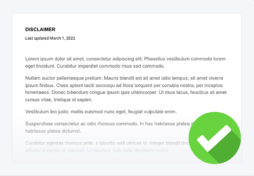A social media disclaimer is a statement posted on social media that helps reduce legal liabilities. A social media disclaimer can also be a dedicated page of rules for users to follow when interacting with your website’s social media.
There are three main types of social media disclaimers:
- Disclaimers for posting on social media
- Social media disclaimers for employees
- Dedicated social media disclaimer pages
Let’s look at how these types of social media disclaimers can be used to protect yourself or your website.
Do You Need a Social Media Disclaimer?
No, you don’t need a social media disclaimer. However, you can benefit from having a social media disclaimer if your website has a social media presence or if you represent your employer on social media.
Social media disclaimers serve as warning signs to your users. They can warn about various aspects of your social media presence, like whether the opinions posted are those of an employee not the company, or if a user will be banned for posting inappropriate comments on your social media feed.
These warnings make your expectations of users clear, and limit the chance of you getting sued, penalized, or otherwise punished in the future for pitfalls that may be hiding in your social media.
Read on to better understand the types of social media disclaimers, how they’re used, and which ones you may need.
Disclaimer for Posting on Social Media
Disclaimers are often added to social media posts to reduce the legal liabilities associated with posts themselves. Here are some of the most common disclaimers used when posting on social media, and why you may need them:
- Copyright disclaimers: a copyright disclaimer is useful if you own the material on your social media pages. Copyright disclaimers tell users that the material on your page is yours, and that using your content without your permission could lead to legal actions.
- Fair use disclaimers: a fair use disclaimer tells users that the content on your page contains copyrighted material that you do not own, but is protected by the fair use exception of the copyright act.
- Affiliate disclaimers: an affiliate disclaimer (also referred to as an affiliate disclosure) is a statement on your social media that tells users that you are being paid by companies to promote, review, or recommend their products. Under FTC guidelines, this is a legally required disclaimer.
Social Media Disclaimer for Employees
If you represent a company on social media, you may want to include a short opinion disclaimer, also known as a views expressed disclaimer.
If you’re identified on social media as a representative of your employer, your personal social media posts can be interpreted as official statements of your company.
By including an opinion disclaimer that separates your personal opinions from that of your employer’s, you can lower the risk of backlash from your employer for the content on your personal social media posts.
Dedicated Social Media Disclaimer Page
Your website may use social media as a way for users to interact with each other and your brand. But given the nature of social media, there’s always the risk of disruptive users.
A dedicated social media disclaimer page helps set standards for user behavior on your social media platforms, and allows you to take action against disruptive users.
Social Media Disclaimer Examples
Let’s look at some examples of social media disclaimers to better understand how they’re used.
Examples of Disclaimers for Posting on Social Media
Let’s look at a couple examples of different types of commonly used disclaimers for posting on social media.
Copyright Disclaimer
Here’s an example of a copyright disclaimer posted in the description of the Youtube music video for Daft Punk’s “Get Lucky”:
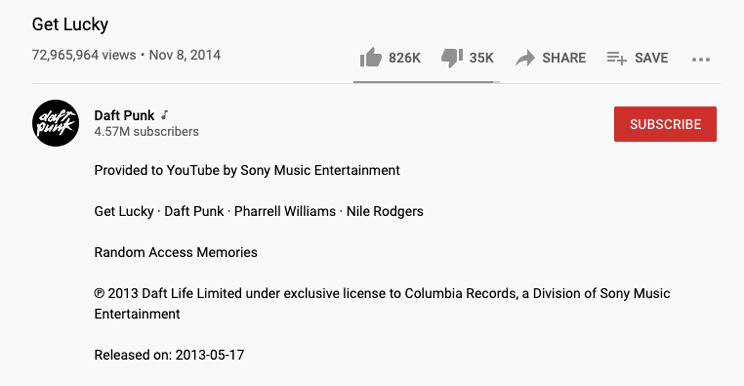
In the example, you can see that the owners of Daft Punk’s Youtube page have stated that the copyright for this work of music belongs to the artists and their record label.
By marking out their copyright, the copyright owners can show users that they are aware of copyright law, and are prepared to defend their claim of copyright in the event of a copyright infringement scheme.
Fair Use Disclaimer
Many companies post their fair use disclaimers within their impressums on Facebook. Consider the disclaimer posted inside the impressum of Late to the Game’s Facebook page:
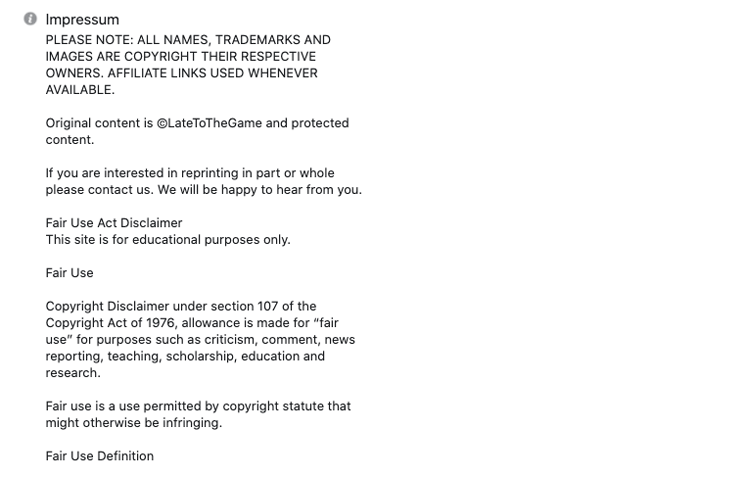
By stating that it’s aware of its copyright obligations and the fair use exception, Late to the Game shows that it’s confident its content does not violate copyright laws. Doing so puts the blog at a lower risk of getting a cease and desist letter or a copyright infringement claim.
Social Media Disclaimer for Employees Examples
Here’s an example of an opinion disclaimer for employees used on a social media account.
Neal Katyal, the former Acting Solicitor General of the United States, has a disclaimer on his Twitter profile that says: “all views mine, no one else’s”:
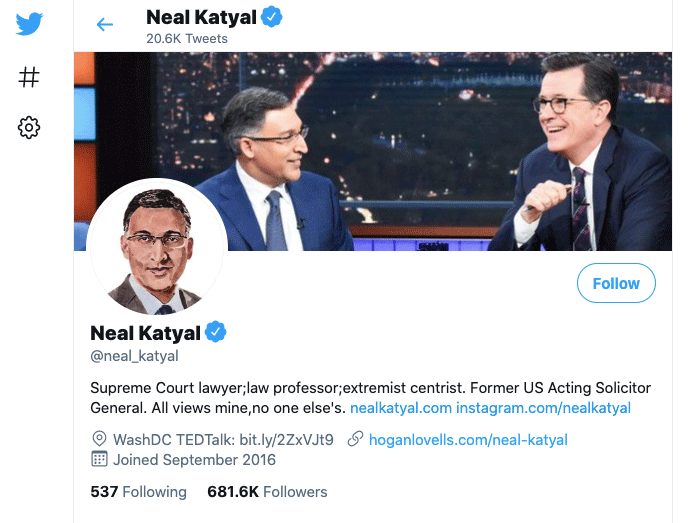
By clearly stating that the opinions on his Twitter are personal, the former Acting Solicitor General can limit the possibility of users mistaking his personal opinions as official policy.
Like in the example, social media disclaimers for employees are usually located in prominent locations, such as the profile section of a twitter page.
Dedicated Social Media Disclaimer Page
A good example of a dedicated social media disclaimer page is Heritage Bank’s social media disclaimer.
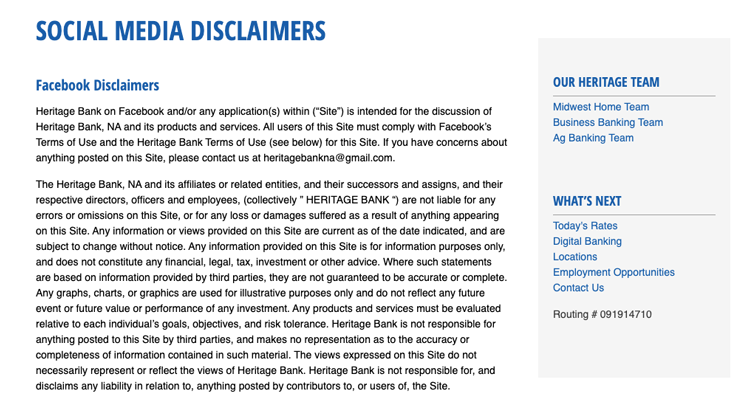
In its disclaimer, Heritage Bank lists all of the social media platforms that it has a presence on. In addition, it states the rules that users need to follow when they are using its social media pages.
Importantly, the disclaimer states that users must comply with Facebook’s rules and guidelines.
Generate a Free Customized Disclaimer Using Termly
Here’s how you can use Termly’s generator to create a custom and legally compliant disclaimer for your needs.
Step 1: Go to Termly’s disclaimer generator.
Step 2: Answer a few simple prompts and questions, and go through all of the steps until you reach “Final Details.”
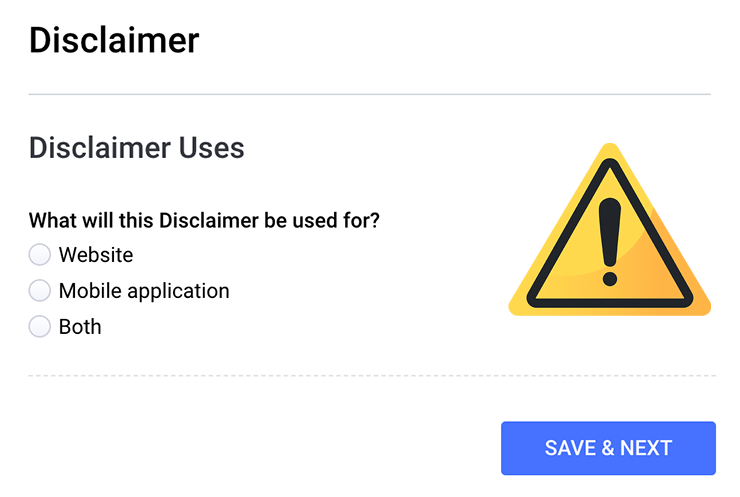
Step 3: Once you’ve filled in everything and you are satisfied with the preview, click “Publish.” You will then be prompted to create an account on Termly so you can save and edit your legal disclaimer further.
How to Write a Social Media Disclaimer
While every social media disclaimer is different, here are some basic steps that you can take to write them.
Disclaimer for Posting on Social Media
If you are writing disclaimers for posting on social media, consider the following:
- If you own the copyrighted material on your page, state your proof of copyright inside the post.
- If the contents of your posts are protected by fair use, explain how you comply with fair use principles. You should also cite or link to Section 107 of the Copyright act in your explanation.
- If your pages make money through affiliate partnerships, you need to identify all the partners you work with, and what your affiliate relationship is. For more detailed instructions on how to do so, check the FTC’s endorsement guidelines.
Social Media Disclaimer for Employees
If you’re writing a social media disclaimer as an employee, you should write a 1-2 sentence statement on how the opinions expressed in your social media posts are strictly personal.
Dedicated Social Media Disclaimer Page
If you’re writing a dedicated social media disclaimer page, you need to:
- List every social media platform that your business/website has a presence on.
- Tell users that they need to follow the rules on your terms and conditions and social media disclaimer page.
- State the rules that users need to follow.
- List the consequences that users will face if they break your rules.
- If you know that your social media page will link to external pages, inform users that the views expressed on them belong only to its content creators.
In addition to the steps above, ensure your disclaimer is easily accessible, preferably through a link on your website somewhere near its header or footer.
Social Media Disclaimer Template
Customize or use one of the following social media disclaimer templates for employees if you need to separate your social media presence from the views of your company:
Views expressed are my own.
or
All opinions are my own.
or
The opinions expressed here belong solely to myself, and do not reflect the views of my employer / [insert name of employer].


